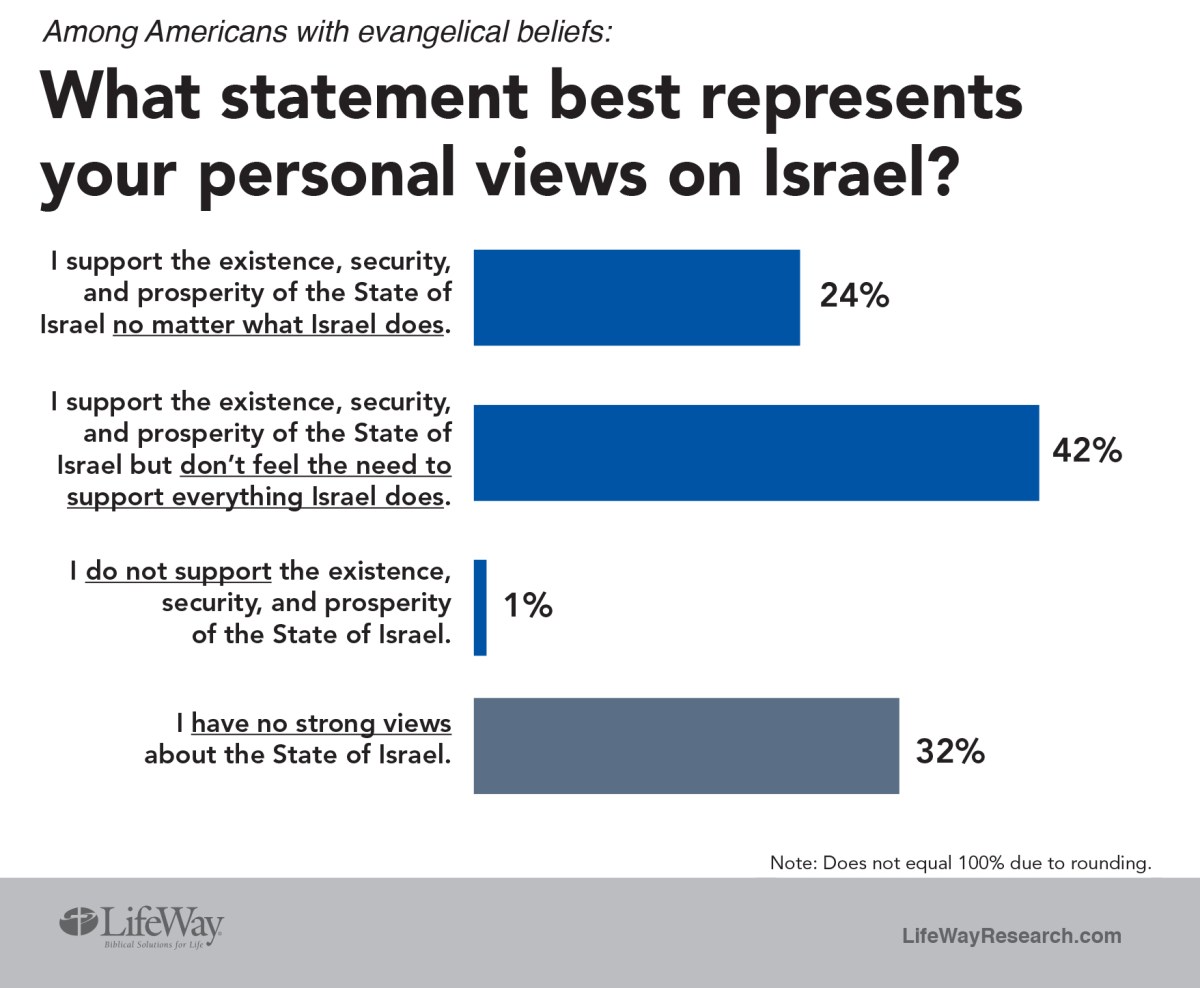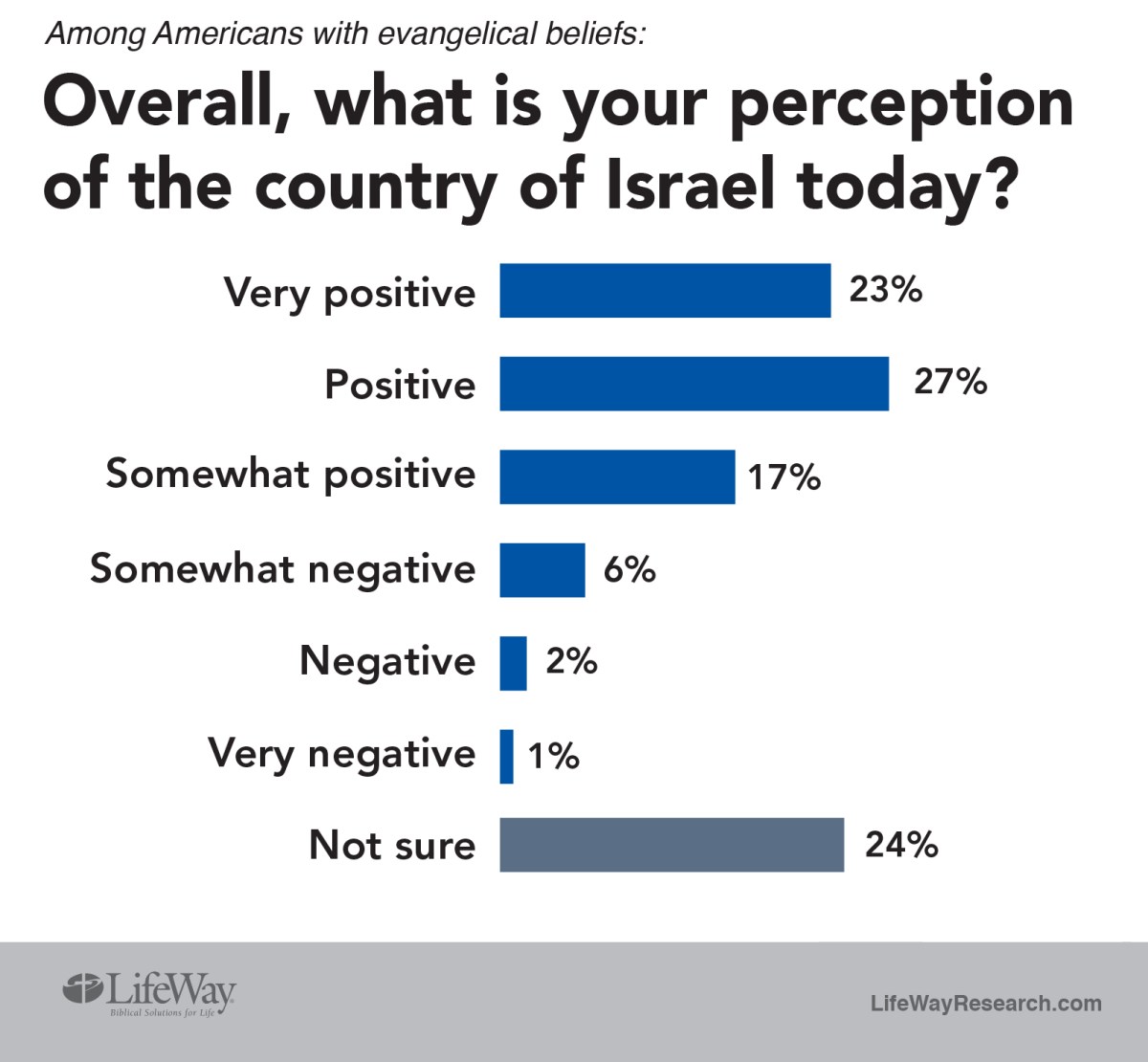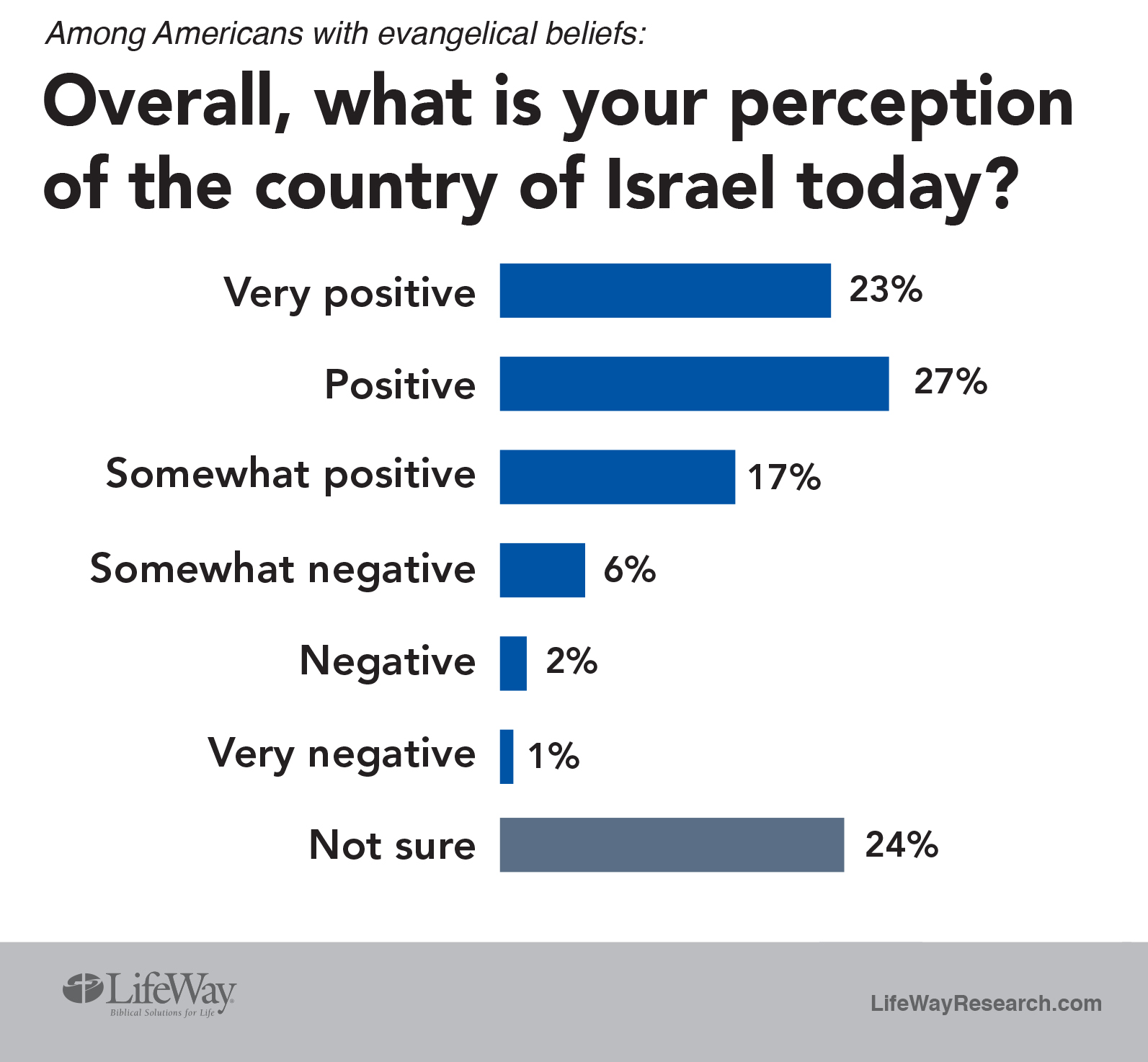In this series

American evangelicals love Israel—if they’re older. But many younger evangelicals simply don’t care, according to a new survey from Nashville-based LifeWay Research.
Three-quarters (77%) of evangelicals 65 and older say they support the existence, security and prosperity of Israel. That drops to 58 percent among younger evangelicals, those 18 to 34.
Four in 10 younger evangelicals (41%) have no strong views about Israel.
Fewer younger evangelicals (58%) have an overall positive perception of Israel than older evangelicals (76%).
And they are less sure Israel’s rebirth in 1948 was a good thing.
“For the most part, younger evangelicals are indifferent about Israel,” said Scott McConnell, executive director of LifeWay Research.
Most evangelicals support Israel
LifeWay Research asked 2,002 Americans with evangelical beliefs about a wide range of issues involving Israel—from its place in the Bible to its treatment of Palestinians. The survey focused on Americans with evangelical beliefs, rather than self-identified evangelicals.
Overall, this group was supportive of Israel.
Sixty-seven percent have a positive view of that nation. Nine percent have a negative view. Twenty-four percent are not sure.
One-fourth (24%) support the existence, security and prosperity of Israel, no matter what Israel does. Forty-two percent support Israel, but not everything Israel does. One percent do not support Israel. Thirty-two percent have no strong views about Israel.

Few (14%) agree when asked whether Israel’s rebirth was an injustice to Arabs in the Middle East. Fifty percent disagree. Thirty-six percent are not sure.
About a quarter (22%) say modern Israel has been unfair to Palestinians. Forty-one percent disagree. Thirty-seven percent are not sure.
Younger evangelicals (19%) are more likely to see the rebirth of Israel as an injustice. Only 34 percent disagree. Forty-seven percent are not sure.
Among older evangelicals, 9 percent see the rebirth of Israel as an injustice, while 62 percent disagree. Twenty-eight percent are not certain.
Older evangelicals (49%) are more likely to disagree that Israel has been unfair to Palestinians. Young evangelicals (32%) are less likely.
Mitch Glaser, president of Chosen People Ministries, which helped underwrite the survey, said he was glad to see that most evangelicals support Israel.
Still, he found the decline of support among younger evangelical believers worrisome.
“I am concerned for the obvious decline in support for Israel among millennial followers of Jesus, who either do not know what they believe or do not seem to care,” he said.
Darrell L. Bock, a board member for Chosen People Ministries and director of cultural engagement at Dallas Theological Seminary, wonders if Israel is on the back burner for many younger evangelicals.
When they think about the Middle East, they’re more likely to think about Iraq or Iran or the impact of terrorism in the world, he said.
“The terror attacks on 9/11 changed the Middle East equation, and young people just aren’t sure where Israel is supposed to fit,” he said.

The Bible plays a big role
Most evangelical believers in the LifeWay Research survey say faith shapes their views on Israel.
Three-quarters (76%) say Christians should support the right of the Jewish people to live in the sovereign State of Israel. Five percent disagree. Twenty percent are not sure.
Sixty-nine percent say the Jewish people have a historic right to the land of Israel. Six percent disagree. Twenty-five percent are not sure.
Only 19 percent say Palestinians have a historic right to Israel. Forty-six percent disagree. Thirty-four percent are not sure.
Forty-one percent say Jewish people have a “biblical right” to Israel but have to share it.
Twenty-eight percent disagree. Thirty-one percent are not sure.
African-Americans with evangelical beliefs are least likely (54%) to say Jewish people have a “biblical right” to the land of Israel. They are also least likely (50%) to have a positive view of Israel.
Among other findings:
- 45% say the Bible has had the biggest influence on their views of Israel.
- 63% say they support Israel primarily because “God gave the land of Israel to the Jewish people.”
- 22% are not sure if biblical promises about the land of Israel are still in force.
- 80% say God promised the land of Israel to Abraham and his descendants for all time.
- 80% say the rebirth of Israel in 1948 was a fulfillment of biblical prophecy.
Author Joel C. Rosenberg, who also helped underwrite the survey, said most evangelicals see a connection between the Bible and the modern nation of Israel. But he said he’s worried that’s not the case for younger evangelicals, which could cause evangelical support for Israel to drop in the future.
“Unless the church gives younger believers a healthy, balanced, solidly biblical understanding of God’s love and plan for Israel, overall evangelical support for the Jewish state could very well plummet over the next decade as millennials represent an ever-larger percentage of the overall church body,” Rosenberg said.
Israel and Palestinians
Evangelical believers are uncertain how to resolve differences between Israelis and Palestinians. A quarter (23%) say Israel should sign a treaty allowing Palestinians to have a sovereign state in the West Bank and Gaza. Thirty-one percent disagree. Forty-six percent are unsure.
Six in 10 (59%) say Christians should do more to love and care for Palestinians. Sixteen percent disagree. Twenty-five percent are not sure.
Among younger evangelicals, two-thirds say Christians need to do more to care for Palestinians. That drops to 54 percent among those 65 and older.
Most evangelical believers (73%) agree they are concerned for the safety of Christians in areas controlled by the Palestinian Authority. Five percent disagree. Twenty-two percent are not certain.
Evangelicals are certain God wants the State of Israel to exist, said McConnell. But they think Christian love should include Palestinian people.
“They believe God wants Israel to be there,” he said, “but they also think God cares how the nation of Israel acts.”
Bob Smietana is senior writer for Facts & Trends.
Methodology:
LifeWay Research conducted the study Sept. 20-28, 2017. The study was sponsored by Chosen People Ministries and author Joel C. Rosenberg. The survey was conducted using the web-enabled KnowledgePanel®, a probability-based panel designed to be representative of the U.S. population. Initially, participants are chosen scientifically by a random selection of telephone numbers and residential addresses. People in selected households are then invited by telephone or by mail to participate in the web-enabled KnowledgePanel®. For those who agree to participate but do not already have internet access, GfK provides at no cost a laptop and ISP connection.
Sample stratification and weights were used for gender by age, ethnicity, region, education and household income to reflect the most recent U.S. Census data. The completed sample is 2,002 surveys. The sample provides 95 percent confidence that the sampling error does not exceed plus or minus 2.7 percent. Margins of error are higher in sub-groups.
Respondents were screened to include only adults with evangelical beliefs. Evangelical beliefs are defined using the NAE LifeWay Research Evangelical Beliefs Research Definition based on respondent beliefs. Respondents are asked their level of agreement with four separate statements using a four-point, forced-choice scale (strongly agree, somewhat agree, somewhat disagree, strongly disagree). Respondents are categorized as having evangelical beliefs if they strongly agree with all four statements:
- The Bible is the highest authority for what I believe.
- It is very important for me personally to encourage non-Christians to trust Jesus Christ as their Savior.
- Jesus Christ’s death on the cross is the only sacrifice that could remove the penalty of my sin.
- Only those who trust in Jesus Christ alone as their Savior receive God’s free gift of eternal salvation.
LifeWay Research is a Nashville-based, evangelical research firm that specializes in surveys about faith in culture and matters that affect churches.

















